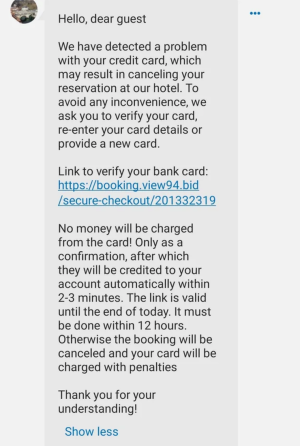Traveller narrowly escapes a booking scam—don’t be the next victim!
By
- Replies 2
The internet has opened up a world of opportunities, especially for explorers and travellers.
With just a few clicks, we can swiftly plan and book our dream trips, broadening our horizons from the comfort of our homes.
But for all its handy benefits, digital booking systems are not without their potential dangers.
The anonymity of online dealings can breed an unfortunate sense of false security, opening up opportunities for crafty scammers who prey on unsuspecting victims.
Be that as it may, there's no need to shun this convenient mode of travel planning.
Instead, we need to be equipped with the knowledge to safeguard ourselves from potential scams: know the hints, signs, and what to steer clear of.
This article reveals an eye-opening account of one savvy traveller who was just a click away from falling prey to a scam and how they navigated the situation safely.
The unsuspecting traveller was innocently arranging a European holiday from the popular hotel reservation platform Booking.com.
Things took an eerie turn when they received a message through the platform's official messaging system, asking them to re-enter their credit card details due to a supposed issue with the previous transaction.
Although there have been countless warnings about the types of scams circling the travel industry, this was different.
It seemed authentic because it came through an 'official' messaging system.
'They almost had me due to it being done through the official messaging system,' the traveller revealed.
But the sly trickery did not end there.
The message assured the customer that no extra funds would be withdrawn from their card and cleverly added urgency to the mix, stating that the user ‘must’ click the link and resolve the issue within 12 hours.
Thankfully, the traveller did not click on the suspicious link and decided to warn others about their 'near miss'.
They shared their experience online, urging others to tread cautiously when it comes to financial details.
With a bit of cyber-detective work, several online users hypothesised that these crooks likely targeted individual hotels, hacking into their internal systems to gain access to guests' personal data.
However, this traveller was not satisfied with merely warning others. They realised something was off.
In the wake of this situation, other online users shared similar stories, revealing an unfortunate trend of similar scams. Tricks like these are common, it seems, dressing up as legitimate requests for personal information through booking websites.
One person pointed out another suspected scam requesting them to verify their card details with a convincingly realistic link that wasn't authentic.
'The website it leads to is NOT legitimate–it's a phishing website that looks extremely convincing (it reflects all your personal booking details),' they cautioned fellow users.
Another observant user highlighted that one could spot the scam by paying close attention to the website and the message language.
'The dead giveaway is the website's “complete-go.com” is not “booking.com”.’
‘There's also missing punctuation in the third statement, and an incomplete sentence in the last statement', they warned.
With this new scam coming to light, it pays to stay vigilant and ensure that your personal information doesn't fall into the wrong hands.
Keep your eyes peeled for any red flags, especially when it comes to your financial details.
Make sure to contact any organisation directly if you receive suspicious messages asking for personal information.

Explore our Scam Watch forum for more information on potential scams and tips on how you can avoid them.
Have you experienced a similar scam before? Do you have any advice on how to avoid potential scams such as this one? Share your thoughts with us in the comments below!
With just a few clicks, we can swiftly plan and book our dream trips, broadening our horizons from the comfort of our homes.
But for all its handy benefits, digital booking systems are not without their potential dangers.
The anonymity of online dealings can breed an unfortunate sense of false security, opening up opportunities for crafty scammers who prey on unsuspecting victims.
Be that as it may, there's no need to shun this convenient mode of travel planning.
Instead, we need to be equipped with the knowledge to safeguard ourselves from potential scams: know the hints, signs, and what to steer clear of.
This article reveals an eye-opening account of one savvy traveller who was just a click away from falling prey to a scam and how they navigated the situation safely.
The unsuspecting traveller was innocently arranging a European holiday from the popular hotel reservation platform Booking.com.
Things took an eerie turn when they received a message through the platform's official messaging system, asking them to re-enter their credit card details due to a supposed issue with the previous transaction.
Although there have been countless warnings about the types of scams circling the travel industry, this was different.
It seemed authentic because it came through an 'official' messaging system.
'They almost had me due to it being done through the official messaging system,' the traveller revealed.
But the sly trickery did not end there.
The message assured the customer that no extra funds would be withdrawn from their card and cleverly added urgency to the mix, stating that the user ‘must’ click the link and resolve the issue within 12 hours.
Thankfully, the traveller did not click on the suspicious link and decided to warn others about their 'near miss'.
They shared their experience online, urging others to tread cautiously when it comes to financial details.
With a bit of cyber-detective work, several online users hypothesised that these crooks likely targeted individual hotels, hacking into their internal systems to gain access to guests' personal data.
However, this traveller was not satisfied with merely warning others. They realised something was off.
In the wake of this situation, other online users shared similar stories, revealing an unfortunate trend of similar scams. Tricks like these are common, it seems, dressing up as legitimate requests for personal information through booking websites.
One person pointed out another suspected scam requesting them to verify their card details with a convincingly realistic link that wasn't authentic.
'The website it leads to is NOT legitimate–it's a phishing website that looks extremely convincing (it reflects all your personal booking details),' they cautioned fellow users.
Another observant user highlighted that one could spot the scam by paying close attention to the website and the message language.
'The dead giveaway is the website's “complete-go.com” is not “booking.com”.’
‘There's also missing punctuation in the third statement, and an incomplete sentence in the last statement', they warned.
With this new scam coming to light, it pays to stay vigilant and ensure that your personal information doesn't fall into the wrong hands.
Keep your eyes peeled for any red flags, especially when it comes to your financial details.
Make sure to contact any organisation directly if you receive suspicious messages asking for personal information.
Key Takeaways
- A traveller was nearly a victim of an online booking scam and shared their experience to warn others.
- The scam involved a message sent through the official Booking.com messaging system, asking the guest to re-submit their credit card details due to an ‘issue’.
- The traveller discovered they were not the only guest to receive such a message-–the hotel they had booked with was also being targeted by phishers.
- Other online users revealed that this is a common scam, with scammers creating fake websites to gather the financial details of unsuspecting travellers.
Explore our Scam Watch forum for more information on potential scams and tips on how you can avoid them.
Have you experienced a similar scam before? Do you have any advice on how to avoid potential scams such as this one? Share your thoughts with us in the comments below!










